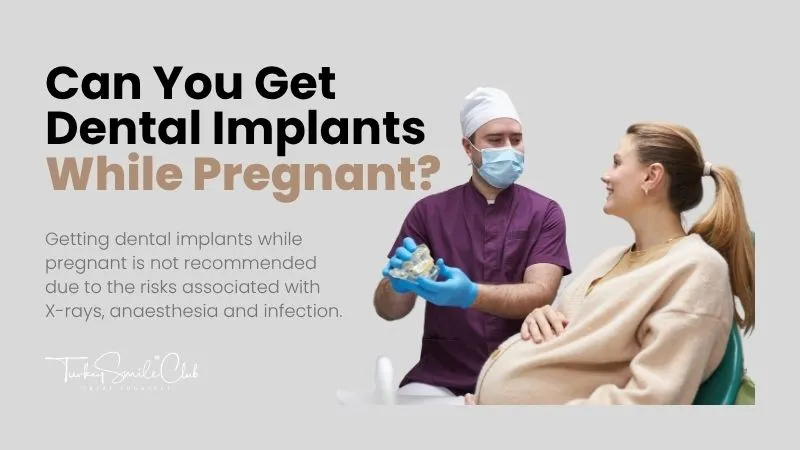
Can You Get Dental Implants While Pregnant?
Can You Get Dental Implants While Pregnant?
It is not recommended to have dental implants during pregnancy. During this period, hormonal changes in the mother-to-be’s body are significant, and the immune response and tissue healing are slower. In addition, dental implant treatment involves X-rays, anaesthesia, and surgical procedures. In Antalya, pregnant women are not allowed to enter X-ray rooms. For this reason, Turkish dentists postpone dental implant treatment until after childbirth for the safety of both the mother and the baby.
To learn more about why implant treatment is not recommended during pregnancy, please continue reading
Why dental implant surgery is not recommended during pregnancy?
Risks of X-rays during pregnancy
X-ray imaging is essential in dental implant planning. It helps determine bone density, the position of nerves, and the exact area where the implant will be placed. Dental X-rays used with modern technology have a very low radiation dose, and the device captures images only of the mouth area. Despite this, unnecessary radiation exposure should be avoided during pregnancy.
In particular, during the first three months of pregnancy, there is a risk that radiation may affect the developing organs and tissues of the baby. For this reason, dentists postpone non-urgent procedures that require X-rays until after childbirth.
Local anaesthesia and its effects on the baby
Local anaesthetic agents are generally safe. However, during pregnancy, the body’s ability to absorb and metabolise these drugs changes. The physiological changes occurring in the mother’s body may reduce blood flow to the baby.
Studies to determine the effects of these drugs on pregnant women are not permitted. Therefore, although no direct harm has been proven, it is safer to avoid anaesthesia for non-urgent surgical procedures. Since dental implants are not an urgent treatment, it is recommended to postpone them until after childbirth.
Hormonal changes and gum sensitivity
Increased levels of oestrogen and progesterone during pregnancy can cause gingivitis. This condition leads to swelling, sensitivity, and bleeding of the gums.
Surgical procedures performed during this period may increase the risk of gum infection and prolong healing time. Furthermore, due to the heightened sensitivity during pregnancy, the gums may react unpredictably to foreign materials such as sutures or implants.
Increased risk of infection
During pregnancy, the immune system is suppressed to allow the baby to develop safely in the mother’s womb. This prevents the body from recognising the baby as ‘foreign tissue’. However, it also reduces the mother’s resistance to infections.
After dental implant surgery in Antalya, the tissues must heal without infection, and antibiotics may be required to prevent it. In addition, performing surgical procedures when the immune system is weakened can delay healing and negatively affect the integration of the implant into the bone (osseointegration).
To protect both the baby and the expectant mother from possible complications, it is safer to perform the procedure after the postpartum period, when the immune system has fully recovered.
Why most dentists advise waiting until after birth?
Dentists prefer to postpone implant treatment during pregnancy to avoid unnecessary risks. After childbirth, the effects of pregnancy hormones subside, and the gums return to their normal condition. The mother’s immune system strengthens, and her body responds better to surgical healing.
When is the best time to get dental implants after pregnancy?
How soon is safe timing after childbirth?
After giving birth, the mother’s immune and hormonal balance gradually return to normal. During this period, if pregnancy gingivitis was present, the gums will heal. For this reason, it is recommended to wait 5–6 months before getting dental implants.
However, each patient’s health condition varies. For individuals with healthy gums and sufficient bone structure, treatment planning can be done earlier. The dentist determines the most appropriate time by evaluating the patient’s overall health, medications, and breastfeeding status.
Can you get implants while breastfeeding?
Breastfeeding is not an absolute contraindication for implant treatment. However, the anaesthetic agents used during the procedure can pass into the bloodstream in small amounts. Painkillers and antibiotics may also be required, and these medications can reach the baby through breast milk.
It is very important to consult your dentist before having dental implants placed. They will recommend medications based on your breastfeeding status and overall health condition, or they may schedule a more suitable date for your treatment.
Safe alternatives to dental implants while pregnant
If you are unhappy with the appearance of your missing front tooth and are pregnant, you may consider temporary solutions. Temporary bridges or removable dentures can preserve both chewing function and aesthetics.
You may opt for methods that allow easy adaptation, such as flexible dentures. These dentures can be used safely if you have a metal allergy.
Another option is lightweight, removable dentures called removable partial dentures, which temporarily replace one or more missing teeth. These dentures are easy to fabricate, affordable, and do not require surgery, offering both aesthetic and functional benefits during pregnancy.
Once your postpartum recovery period is complete, you can choose a permanent implant in Antalya instead of temporary treatments. Since these types of restorations do not require surgery, they serve as a safe and effective temporary solution until postpartum implant planning is completed.